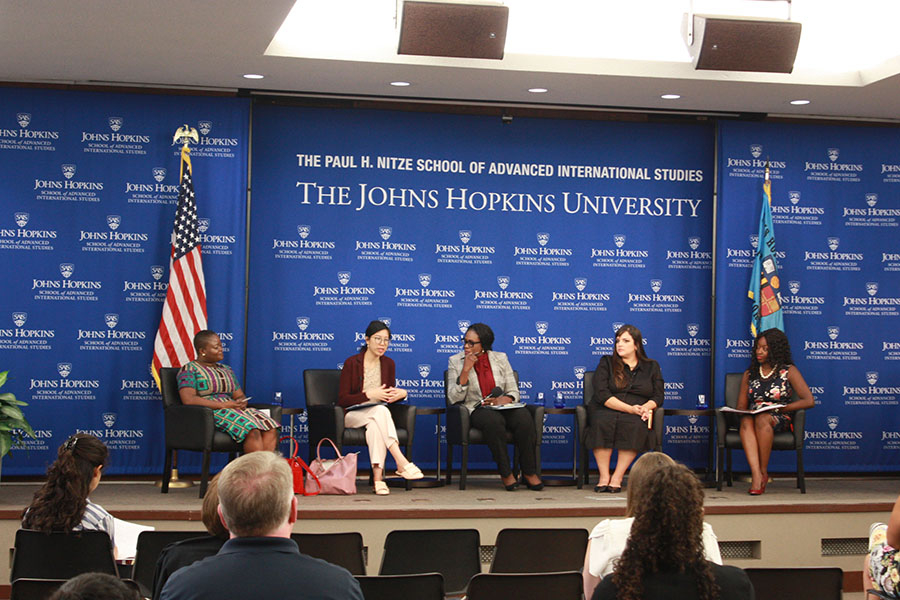The Women of Color Advancing Peace and National Security

Ambassador Bonnie Jenkins, Founder and Executive Director of the Women of Color Advancing Peace and Security (WCAPS)
Maritza Adonis, Chief Executive Officer, Government Relations, MTA Visions Global
Kara Hernandez, Strategic Consultant on International Security, Conventional Weapons, and Science Diplomacy
Christina Li, Senior Advisor for Religious Freedom, US Agency for International Development
Joyce Williams, Managing Attorney, Armooh-Williams, PLLC
Moderated by Chiedo Nwankwor, Visiting Research Associate, Lecturer, and Director of SAIS Women Lead
September 18, 2019
The school hosted a discussion on the connections between global and domestic security threats and how the issues directly impact women of color. The panelists addressed the question of whether traditional definitions of national security adequately capture the threats to the United States and abroad.
During the discussion, Ambassador Jenkins noted the incredible growth of the Women of Color Advancing Peace and Security (WCAPS) Organization, which she established two years ago. She emphasized the need to increase the number of women of color in public affairs and security issues to ensure that there are diverse voices on the cross-cutting issues of peace and security, which WCAPS aims to achieve through it programs and working groups that address three main areas: nuclear weapons, climate change, and cyber security.
Chiedo Nwankwor shared insights on how the changing landscape of globalization brings about new security threats. Therefore, individuals and state agents need to rethink the notion of national security.
Joyce Williams, who specializes in immigration law and project finance, explained how the movement of people is closely linked to security locally and globally. Following that, Williams stated that immigration policy has to look at both security and economic aspects to ensure the national security of a country. Discussing how United States immigration policy may affect women globally, Williams stated that previous attorney general, Jeff Sessions’ decision to reduce asylum for victims of domestic violence and current attorney general, William Barr’s decision to narrow opportunities for women from Central America to seek asylum in America represent threats to women’s security on a global level.
Christina Li noted that faith-based organizations are often our strongest partners in discussions revolving around peace and security. She added that it is fundamental to look as religious rights as human rights when discussing the notion of national security. Li argued that rather than focus on the negative role religion may play in national security, we should engage with religious leaders as they are fundamental leaders in civil society.
Kara Hernandez spoke of her persistent efforts to nudge foreign policy institutions to hire a more diverse pool of individuals. Hernandez stated that with more diversity, there is more global connectedness, and this brings about a new power and dynamic to the story of national security. She remarked that the discourse is currently changing, and this is an important addition to the more traditional tools of diplomacy.
Maritza Adams stressed the need for stakeholders to see themselves as global citizens. Adams noted that stakeholders need to communicate better and improve their cultural competency to enable smoother business and personal relations across borders. To do this, Adams said that we have to help people see the stake they have in discussions of national security and women’s interests, and then invite them to the table.
The event concluded with questions from the audience that touched on such topics as building communities to the role of women in the peace processes.
View video